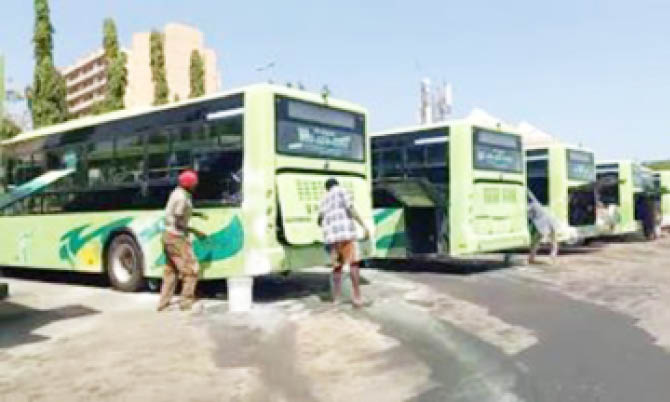Claim: A widely circulated video is claiming that the federal government bought used buses for its palliative programme designed to reduce the cost of transportation in the country.
Verdict: The claim is false. Daily Trust on Sunday spoke with government officials from the Ministry of Transport and the Federal Capital Territory Authority (FCDA) and they denied that the vehicles belonged to the government. A staff seen working on one of the busses corroborated the response.
Full text
A video showing a team of panel beaters, technicians, and painters carrying out repairs on some Compressed Natural Gas (CNG) buses at the Federal Secretariat car park in Abuja early this week has gone viral.
The video showed the panel beaters carrying out body works on the CNG buses while the painters painted the dented parts of the buses to give them a facelift. Also, the buses had oil dripping from their engines.
An X user, formerly Twitter, Justsoceity, who posted the video claimed that it was the CNG bus procured to mitigate the effect of the subsidy removal.
The account went on to accuse the government of scam due to the rickety nature of the buses.
Also, an online publication, Sahara Reporters, posted the misinformation, with the headline, “Exclusive: Tinubu’s Government Procures ‘Used’ Mass Transit Buses for Nigerians Despite N100billion Budget, Hires Painters, Panel Beaters to Work on Them”
A voice from the video could be heard narrating that, “Guys, I just came to the Federal Secretariat car park. You see the kind of buses the federal government or FCT is planning to put on our roads. I don’t know where they went to and procured all these nonsense over-used busses they want to put on our roads.
“Imagine the country we are in. They said they were going to put new busses, but just look at the floor, you can see engine oil. These are busses that may be up to 20 years. I don’t know where they imported it or where they collected it from, but the busses are not in good condition.
“They are trying to repair and repent them new ones. You can see the country we are in; the government is deceiving the citizens and they are keeping quiet; how on earth. You said you are going to provide new busses for the country and you went and bought used vehicles.”
Background
The federal government had in October announced plans to introduce one million Compressed Natural Gas powered vehicles into the country by 2027.
The announcement, made by the Special Assistant to the President on Special Duties and Domestic Affairs, Toyin Subaru, noted that the vehicles were part of the presidential compressed natural gas initiative (PCNGI) to reduce the impact of removal of fuel subsidy on Nigerians.
Subaru said 11,500 CNG buses were expected to be deployed soon. The government had stated that busses would significantly lower the price of CNG to N230 per kg, making it an affordable and eco-friendly option for citizens.
He emphasized that the integration of CNG-powered mass transit buses would enable Nigerians to save up to two-third of their transportation costs.
While the busses are yet to be deployed, the video had generated uproar and given the impression that the government plans to sleaze Nigerians in the scheme due to the huge funds the government allocated to it.
Verification
When Daily Trust on Sunday visited the Federal Secretariat where the busses were parked, our reporter met one of the engineers working on the busses. He pleaded anonymity and said the busses belonged to a private individual.
The engineer, however, urged our reporter to meet a management staff to make his findings.
After some hours, some management staff made their way to the vicinity and this reporter approached two of them for separate interviews. They said the 14 buses parked at the secretariat did not belong to the federal government, and explained that they were the property of a private company named 360TFA.
They independently told Daily Trust on Sunday that the company had obtained licence from the federal Ggvernment to run CNG buses in Abuja to ease transportation within the city.
“This is a private business and government gave us a license to operate in Abuja. We are business people coming into Abuja to ease transport. The management is private and the funding is also private,” one of the staff said.
Daily Trust on Sunday also reached out to the Director, Press and Public Relations of the Federal Ministry of Transport, Olujumi Otetomi to verify the claim and he disclosed that the ministry did not procure any buss on behalf of the federal government.
“The Federal Ministry of Transportation has not been running public commercial transportation on behalf of the federal government. If anything at all, it is the Federal Capital Territory Authority (FCTA) or Federal Capital Development Authority (FCDA) that would have been doing that,” he said.
On his part, FCTA’s Deputy Director of Information, Transportation Secretariat, Ifeanyi Ughamadu, said the busses belonged to a private individual who was given a licence to commence mass transit service within the FCT.
“It has nothing to do with the FCT Administration or the federal government, it is an individual business,” he said, adding that the company is called 360TFA.”
Conclusion
Based on the information gathered from the staff and some engineers working on the busses, the vehicles belong to a private company and it was not supplied by the government as many erroneously claimed.
This fact-check was produced in partnership with the Centre for Democracy and Development (CDD)

 Join Daily Trust WhatsApp Community For Quick Access To News and Happenings Around You.
Join Daily Trust WhatsApp Community For Quick Access To News and Happenings Around You.


